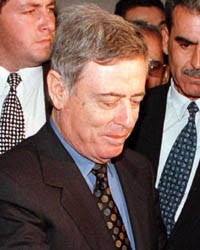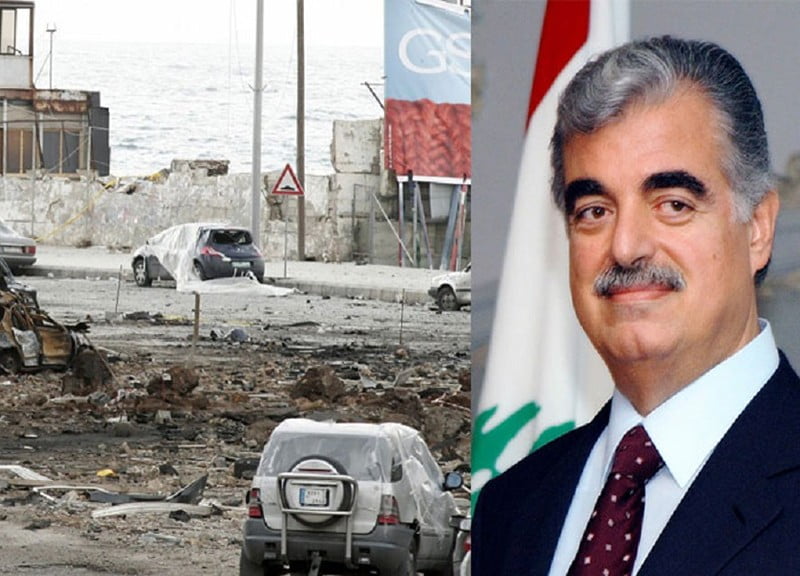There is still much to be told about Abdel-Halim Khaddam, who passed away a few days ago in his Parisian exile. Returning to the life of this man and the roles he played in the Assad regime, both the father and the son, until the end of 2005, reveals connections with Lebanon, particularly regarding President Rafik Hariri. What secrets have not been revealed in this regard?
In a conversation with “Al-Nahar,” a prominent Lebanese political figure currently living abroad and away from the spotlight, who requested not to be named, reveals intriguing information about Khaddam. This information pertains to the Syrian guardianship over Lebanon. Simultaneously, hints are dropped about other figures to avoid embarrassment.
Firstly, this political figure explains the meaning of the phrase “Assad’s cane” in the title of this article. They state that Khaddam rightfully earned this title due to his unwavering defense of President Hafez al-Assad’s regime. They recount an incident where Sheikh Sabah Al-Ahmad Al-Jaber Al-Sabah, who later became the Amir of Kuwait, asked Khaddam on the sidelines of an Arab summit in the late 1980s: “Why, Abu Jamal (Khaddam), do you take such strong positions on behalf of Syria?” Khaddam replied, “Oh Abu Naser (Sabah Al-Ahmad), you have oil, while we have the tongue.”
This figure recounts that the arrival of President Rafik Hariri on the Syrian influence scene, under the protection of “Assad’s cane,” began in the first half of the 1980s, specifically after the Israeli invasion of Lebanon in 1982. At that time, Hariri was often referred to as the “Saudi-Lebanese businessman.” Hariri’s name and title were mentioned every time Prince Bandar bin Sultan, the Saudi Ambassador to Washington at that time, visited the Syrian capital. He was tasked by King Fahd bin Abdulaziz to coordinate efforts between Damascus and Riyadh to find a settlement in Lebanon, avoiding additional woes of war. During this stage, as President Amin Gemayel assumed the presidency in late 1982, succeeding his brother Bashir, there were looming risks of a conflict later known as the “Mountain War,” which erupted in the fall of 1983. Prince Bandar, accompanied by Hariri at the request of the Saudi monarch, tried to find common ground between the conflicting parties, especially between the leader of the Progressive Socialist Party, Walid Jumblatt, and the “Lebanese Forces” founded by Bashir Gemayel. The Saudi mediator sought Hariri’s assistance in conducting communications with the Baabda Palace to understand his views on solutions. The trips Hariri made using his private plane, which landed in Cyprus and then reached East Beirut on a military helicopter provided by Brigadier General Johnny Abdo, head of intelligence in the Lebanese army at that time, became frequent when discussions prolonged with President Gemayel and his aides. When talks extended, Hariri had to spend the night as a guest of General Abdo before moving the next day to Larnaca and then to Damascus to convey the results of the consultations in Lebanon.
The process of monitoring these consultations in Damascus was undertaken by Prince Bandar, who dealt with the Syrian Vice President Khaddam. Khaddam, in turn, was responsible for preparing the meetings with President Hafez al-Assad, who was very interested in closely following the Lebanese file after his army’s influence receded in the Israeli invasion of 1982 to the Dahr al-Baidar region, extending to the Bekaa Valley and then to the north. As for Hariri, he did not accompany Prince Bandar to any of these meetings with Syrian officials but waited at the hotel until the Saudi mediator returned to travel with him to Riyadh.
According to this account, Hariri, in addition to the consultations in East Beirut, had connections with Lebanese figures in the other part of Beirut, many of whom later became part of the March 8 and March 14 alliances. Hariri was keen to provide financial support to these individuals during a critical economic stage when Lebanon was drowning in the aftermath of the Israeli invasion.
Saudi mediation continued in coordination with Damascus. However, after months, it became apparent that it did not yield results. On the contrary, events unfolded in the opposite direction, coinciding with the decline of Amin Gemayel’s influence in the February 6, 1984 uprising under the banner of rejecting the May 17 agreement and the fragmentation of the unity of the Lebanese army, which disintegrated into factions. Before Saudi-Syrian mediation efforts could arrange Lebanese dialogue in Lausanne after the official Lebanese statement canceling the agreement in March 1984, a mutual friend of Khaddam and Hariri approached Khaddam to arrange the first meeting with Hariri. When this friend proposed the idea of the meeting, justifying it by the benefit of Damascus being fully aware of Amin Gemayel’s position rather than receiving it through mediation that might simplify these data, Khaddam replied that the Syrian authorities preferred to deal with an official Saudi party rather than dealing with a “Saudi businessman of Lebanese origin.” However, Khaddam later reconsidered his opposition to meeting Hariri, even if it was just to understand what information Hariri had.
Thus, the first meeting between Khaddam and Hariri in the first half of the 1980s marked the beginning of a long phase that continued until February 14, 2005, when the former Lebanese Prime Minister was assassinated in a massive explosion. According to information from the Lebanese personality providing these details, Khaddam, after his first meeting with Hariri, realized that Hariri indeed had a lot to add to what reached the Syrian leadership.
The relationship between Hariri and the Syrian leadership through Khaddam continued to progress. However, the beginning of these relationships was not “good news” for many of Damascus’s Lebanese allies at that time, according to the same personality’s description. When these allies learned about these relationships, they erupted in anger because they were accustomed to dealing with Hariri on the basis that he was just a Saudi businessman providing them with financial support without Hariri having any political influence in an area they considered their exclusive privilege. When Khaddam heard about this anger, he handled it in his own way, scheduling a meeting with these allies in advance, holding it with Hariri in a meeting that exceeded the scheduled time, forcing the allies to wait in the office of the Syrian minister’s secretary, who intentionally informed the waiting party that Khaddam was holding an “important” meeting with Hariri. When the time for the meeting arrived, Damascus’s allies realized that Hariri had moved to the forefront of relations with the Syrian leadership, and consequently, he no longer needed a mediator between him and them.


